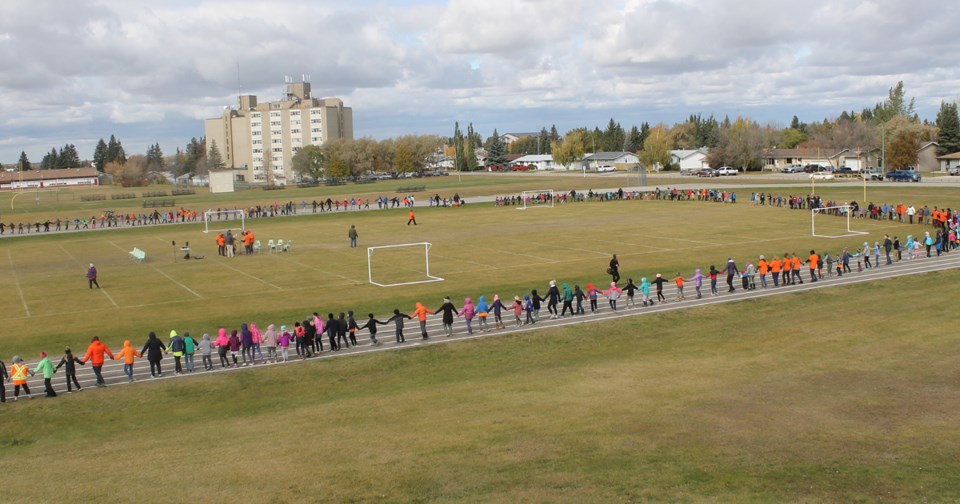MELFORT ŌĆö Hundreds gathered in Melfort to honour residential school survivors and victims during Orange Shirt Day, holding each otherŌĆÖs hands as they walked together in a circle for a round dance.
ŌĆ£The orange shirt round dance and the wearing of the orange shirt is to honour residential school survivors and those who did not make it home,ŌĆØ said Bobbi Gray, director of programs and services for Cumberland College. ŌĆ£The round dance, a dance of friendship is an opportunity to come together in the spirit of truth and reconciliation, wrapping ourselves around the message that every child matters.ŌĆØ
Last year was MelfortŌĆÖs first Orange Shirt Day, and this year Gray estimated the event drew about 200 more participants.
ŌĆ£It warmed my heart to see people are wrapping themselves around the message,ŌĆØ Gray said.
Orange Shirt Day was held on Sept. 28.┬Ā
Residential school survivor Evelyn Burns was in attendance.
┬ĀŌĆ£In order for people to really understand us, where weŌĆÖre coming from, to be able to listen to our story and from there they can learn and maybe help us out and just learn what weŌĆÖre doing with our people and our healing journey,ŌĆØ Burns said. ŌĆ£It was a hard journey. It took me nine years to be where I am today, where I can say forgive me, I forgive the ones that hurt us and I forgive the ones at home when I came home and we were little strangers.ŌĆØ
Burns is now 73. She became partially deaf as a result of physical abuse from teachers at the residential school she was sent to.
ŌĆ£You didnŌĆÖt get scolded. You see my ears? I got trouble with my ears,ŌĆØ Burns said. ŌĆ£IŌĆÖm wearing a hearing aid because of so many hits on the head, and I always hear humming in my ear. IŌĆÖm deaf, and thatŌĆÖs how I came home.ŌĆØ
She remembers teachers putting children into┬Ā burning hot showers, where they cried from the heat hitting their bodies.
ŌĆ£They pushed us in a shower, and we never seen a shower in our life. We used a wash pump to have a bath. And there were a bunch of girls put into the shower and we were all crying because of the hot water, and then when we come out of there they put this white powder on our hair, our body, they said we had lice ... I remember when they ripped off my clothes, my moccasins. And they put them in a box and never seen them again.ŌĆØ
She still remembers the sounds of other children crying in the evening.
ŌĆ£I tried to commit suicide. There was no love. There was nobody there to say, ŌĆśOh my, let me touch your boo boo,ŌĆÖ ŌĆśI love you.ŌĆÖ There was no such thing in a residential school.ŌĆØ
According to Burns, residential schools didnŌĆÖt just affect the youth placed there, but also their families and parents.
ŌĆ£I lost all my family because nine years I didnŌĆÖt see them there, then I came back a strange person and I was in culture shock,ŌĆØ she said. ŌĆ£My granny, they never used to drink, and alcohol was numbness ... I want them to forgive a lot of my people too. Try and understand them because there are still a lot of people out there who havenŌĆÖt dealt with their story and you have to in order to go ahead.ŌĆØ
Growing up, Burns grew to hate her mom, believing she threw her away.
ŌĆ£But she couldnŌĆÖt stay home, because there were no kids, and then when alcohol came into play, it separated. So when I came home there was no mom, and she died soon after. She died here in Melfort, they found her north and stuff here. Wrapped in a blanket and run over. So I never said ŌĆśIŌĆÖm sorryŌĆÖ to my mom until about 10 years, when I sat by her grave.ŌĆØ
Burns said growing up without parents affected her own parenting ability.
ŌĆ£I wasnŌĆÖt a very good parent. Well, I didnŌĆÖt know how to love ... I didnŌĆÖt know how to hold my babies. It was all anger, anger. Then 1978 my old man and I quit drinking. We thought it was the alcohol, but it wasnŌĆÖt. We kept fighting.ŌĆØ
In 1980 she saw a sign for an inner children workshop. Participating in it helped her recover.
For white Canadians, she asks them for acceptance and to understand where the community comes from.
ŌĆ£One of the things that has to be done to us is be able to accept us for what we are, and to accept that, honestly,ŌĆØ Burns said. ŌĆ£Maybe we wouldnŌĆÖt be like that if everything worked out good, because a lot of these young people are fighting and killing and drugging and stealing ... A lot of them didnŌĆÖt deal with what they had at home. The parents sent to residential schools, we didnŌĆÖt know how to love, we didnŌĆÖt know how to hug our kids. My daughter has a hard time forgiving.ŌĆØ
Burns recalled something her youngest son, who is now 53, said to her.
ŌĆ£He said, ŌĆśMom, youŌĆÖre a good mother. I was the cleanest kid on the block and I went to bed in a clean bed. I never had a louse. You were a good mother. But you were never a mommy. I donŌĆÖt remember you holding me and hugging me.ŌĆÖŌĆØ
Burns has not applied for the Indian Resident-ial Schools Settlement Agreement payout for residential school survivors who were physically or sexually abused.
ŌĆ£They canŌĆÖt repair whatŌĆÖs been done,ŌĆØ she said. ŌĆ£I lost everything. My mom, my culture, everything. ThatŌĆÖs why I try to help other people understand us.ŌĆØ
Burns said if she was face-to-face with one of the teachers from the residential schools today, she would not know what to say.
ŌĆ£I donŌĆÖt know if I would be able to say anything to them because they canŌĆÖt ever repair what they done to me.ŌĆØ




